Is Hardwood Flooring Really Better Than Laminate Flooring? Unveiling the Facts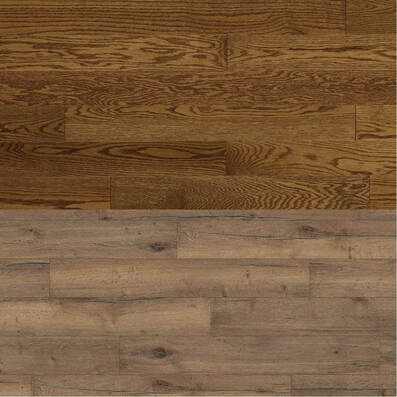 hardwood flooring and laminate flooring samples side by side hardwood flooring and laminate flooring samples side by side Choosing the right flooring for your home is a significant decision that impacts not only the aesthetics but also the functionality and value of your space. One of the most debated topics in this realm is the choice between hardwood and laminate flooring. This article aims to settle the debate by providing an in-depth comparison, helping you make an informed decision. Contact us if you're looking for personalized advice on flooring options. The Basics: Hardwood vs. LaminateHardwood Flooring Hardwood is a natural material made from a single piece of wood, often sourced from trees like oak, maple, or cherry. It's renowned for its durability and can be refinished multiple times to extend its lifespan. Laminate Flooring Laminate, on the other hand, is a synthetic material made from multiple layers. While it mimics the appearance of wood, it doesn't offer the same level of durability. However, it is often more affordable and easier to install. Durability and Longevity
Aesthetic Appeal
Cost Comparison
Maintenance and CareThe level of maintenance required for your flooring can influence your overall satisfaction and long-term costs. Here's how hardwood and laminate compare. Hardwood Floors: Regular Upkeep for Longevity Hardwood floors require consistent care, including periodic sanding and refinishing. However, the effort is often worth it, as proper maintenance can extend the life of your hardwood floors. Laminate Flooring: Easy and Effortless Laminate flooring is generally easier to maintain, requiring just regular sweeping and occasional mopping. If you're looking for a low-maintenance option, laminate could be your go-to choice. Environmental ImpactAs sustainability becomes more important, understanding the environmental impact of your flooring choice is crucial. Hardwood Flooring: Renewable but Resource-Intensive Hardwood is a natural, renewable material but requires significant resources for processing. If sustainability is a priority, consider engineered hardwood as a more eco-friendly option. Laminate Flooring: Lower Impact, Less Sustainability Laminate flooring is less resource-intensive to produce but is not biodegradable. If you're concerned about environmental impact, it's important to weigh these factors when choosing between hardwood and laminate. Choosing between hardwood and laminate flooring involves various factors, including cost, durability, aesthetics, maintenance, and environmental impact. Both options have their merits, and your choice will ultimately depend on your specific needs, lifestyle, and budget. Whether you opt for the natural elegance of hardwood flooring or the practicality and affordability of laminate flooring, make sure to consider all aspects to make an informed decision. FAQIs Hardwood Flooring More Expensive Than Laminate?
Yes, hardwood flooring is generally more expensive both in terms of material and installation. However, it can be a wise long-term investment. Can Laminate Flooring Look Like Real Wood? Modern laminate flooring has improved significantly and can closely mimic the look of real wood. Which Is Easier to Maintain: Hardwood or Laminate? Laminate is generally easier to maintain and is a good option if you're looking for a low-maintenance flooring solution. Is Hardwood Flooring Eco-Friendly? Hardwood is a natural, renewable resource, but it can be resource-intensive to produce. Engineered hardwood is often considered a more eco-friendly option. Can I Refinish Hardwood Floors? Yes, one of the advantages of hardwood flooring is that it can be sanded and refinished multiple times, extending its lifespan.
0 Comments
Engineered Hardwood Flooring: A Comprehensive Guide for Toronto Homeowners
What is Engineered Hardwood Flooring?Engineered hardwood flooring is a type of flooring that is made up of a real hardwood veneer attached to a core constructed from multiple layers of wood, all laid in different directions. This construction method makes engineered hardwood more stable than traditional solid hardwood, especially in Toronto's variable climate. Understanding the Structure of Engineered Hardwood FlooringEngineered hardwood flooring is unique in its construction. Unlike solid hardwood, which is made entirely of a single piece of wood, engineered hardwood consists of a top layer of real hardwood veneer attached to a core of multiple layers of wood. These layers are laid in different directions, which gives engineered hardwood its stability and resistance to changes in temperature and humidity. The thickness of the top veneer layer can vary, but it's typically between 0.6mm and 6mm. The thickness of this layer can impact the lifespan of your engineered hardwood floor, as thicker veneers can be sanded and refinished more times than thinner ones. At Parqueteam Hardwood Flooring, we offer a variety of engineered hardwood flooring options with different veneer thicknesses to suit your needs. Benefits of Engineered Hardwood FlooringEngineered hardwood flooring offers several advantages over other types of flooring. Here are a few reasons why it's a popular choice for homeowners in Toronto:
Engineered Hardwood Flooring vs. Other Flooring OptionsWhen comparing engineered hardwood flooring to other types of flooring, such as laminate and vinyl, it's important to consider factors like cost, durability, and appearance. Engineered hardwood flooring tends to be more expensive than laminate or vinyl flooring. However, it's a long-term investment that can add value to your home. Unlike laminate or vinyl, engineered hardwood can be refinished if it becomes worn or damaged, extending its lifespan and making it a cost-effective choice in the long run. In terms of appearance, engineered hardwood flooring offers the beauty and warmth of real wood, which can enhance the aesthetic appeal of your home. While laminate and vinyl flooring can mimic the look of wood, they cannotmatch the depth and richness of real wood that engineered hardwood flooring provides. When it comes to durability, engineered hardwood flooring holds up well against daily wear and tear. While it can scratch, the ability to refinish the surface means it can look like new for many years. On the other hand, laminate and vinyl flooring can be more resistant to scratches but once damaged, they cannot be refinished and must be replaced. Engineered Hardwood Flooring vs. Laminate Flooring
Installation of Engineered Hardwood Flooring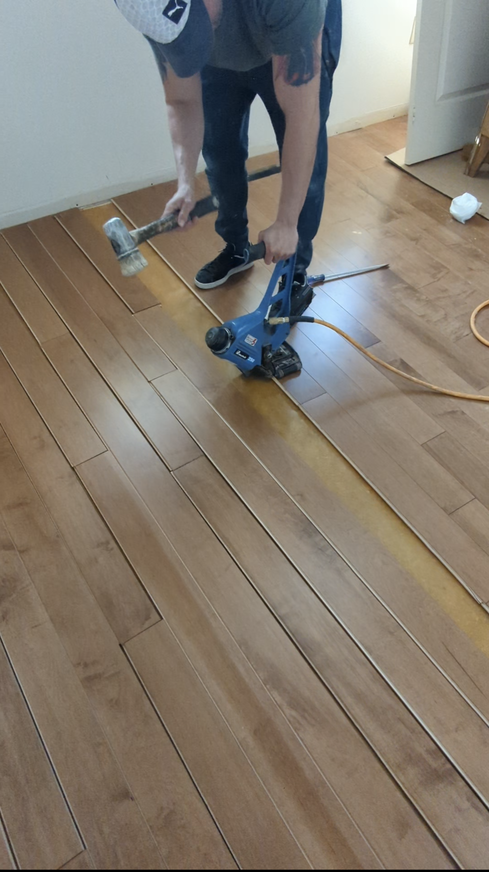 a professional installer meticulously laying down engineered hardwood planks, demonstrating the precision and expertise involved in the installation process. a professional installer meticulously laying down engineered hardwood planks, demonstrating the precision and expertise involved in the installation process. The installation of engineered hardwood flooring is a critical process that can significantly impact the performance and lifespan of your floors. At Parqueteam Hardwood Flooring, we offer professional engineered hardwood flooring installation services, ensuring that your floors are installed correctly and efficiently. There are several methods to install engineered hardwood flooring, including floating, gluing, or stapling. The choice of installation method depends on various factors such as the type of subfloor, the specific engineered hardwood product, and the conditions of your home. A floating installation is a method where the engineered hardwood planks are not attached to the subfloor but are instead attached to each other. This method is relatively quick and easy, making it a popular choice for DIY enthusiasts. The two options for floating install of engineered hardwood floors are: Click system and tongue and groove floating install. Gluing is another method where the engineered hardwood planks are adhered directly to the subfloor with a strong adhesive. This method provides a solid feel underfoot and can help with sound reduction. Nail-Down is a method where the engineered hardwood planks are attached to the subfloor using a special nailer and cleats to nail down the engineered hardwood floor.. This method is typically used when the subfloor is made of wood. Regardless of the installation method, it's crucial to ensure that the subfloor is clean, dry, and level before installation begins. This will help to ensure a smooth and successful installation process. The Cost of Installing Engineered Hardwood FloorsThe cost of installing engineered hardwood floors can vary depending on several factors, including the type of engineered hardwood product, the size of the area to be covered, and the complexity of the installation. As a general rule, you can expect to pay between $3 and $10 per square foot for materials, and between $2 and $8 per square foot for engineered hardwood flooring installation in the Toronto area. At Parqueteam Hardwood Flooring, we strive to provide high-quality engineered hardwood flooring at competitive prices. We also offer professional installation services, ensuring that your new floors are installed correctly and efficiently. Glue or Float: Which Installation Method is Better?One common question we often encounter is whether it's better to glue or float an engineered wood floor. The answer depends on several factors, including the type of engineered hardwood product, the conditions of your home, and your personal preferences. Floating is a method where the engineered hardwood planks are not attached to the subfloor but are instead attached to each other. This method is relatively quick and easy, making it a popular choice for DIY enthusiasts. However, floating floors may not feel as solid underfoot compared to floors that are glued or nailed down. Gluing, on the other hand, involves adhering the engineered hardwood planks directly to the subfloor with a strong adhesive. This method provides a solid feel underfoot and can help with sound reduction. However, it's more labor-intensive and requires a clean, dry, and level subfloor. At Parqueteam Hardwood Flooring, our team of experienced hardwood flooring installers can guide you in choosing the best installation method for your engineered hardwood floors. The Easiest Engineered Hardwood Flooring to InstallWhen it comes to the installation of engineered hardwood flooring, some products are easier to install than others. Engineered hardwood floors with a click-lock system are generally the easiest to install, as they can be floated without the need for nails or glue. This makes them a popular choice for DIY enthusiasts. However, for the best results, it's recommended to have your engineered hardwood floors installed by a professional. At Parqueteam Hardwood Flooring, our team of experienced hardwood flooring installers can ensure a smooth and efficient installation process, providing you with beautifully installed floors that will last for years. Engineered Hardwood Flooring and UnderlayAnother common question is whether engineered wood flooring needs underlay. The answer is yes, but only for engineered hardwood floors that are installed via the floating installation method. In this case, underlay is typically recommended to put under the installed engineered hardwood flooring. The underlay serves several purposes:
For engineered hardwood floors that installed via the nail down installtion method, an underlay is not needed. At Parqueteam Hardwood Flooring, we can advise you on the best type of underlay for your engineered hardwood floors, ensuring optimal performance and longevity. The Lifespan of Engineered Hardwood Floors
Do Engineered Wood Floors Scratch Easily?Like all types of hardwood flooring, engineered hardwood floors can scratch. However, the degree to which they scratch depends on several factors, including the hardness of the wood species used in the top veneer layer, the finish applied to the floors, and how the floors are used and maintained. To prevent scratches, it's important to keep your floors clean and free of dirt and grit, which can cause scratches. Using furniture pads, maintaining a suitable indoor humidity level, and avoiding walking on the floors with high heels or sports shoes can also help prevent scratches. If your engineered hardwood floors do get scratched, they can be sanded and refinished to restore their appearance. However, the number of times the floors can be refinished depends on the thickness of the top veneer layer. For Conclusion...Engineered hardwood flooring is a versatile and durable flooring option that offers the beauty of real wood with the practical benefits of man-made materials. Whether you're renovating your home or installing new floors, engineered hardwood flooring is a worthy consideration. We hope this comprehensive guide has provided you with valuable insights into engineered hardwood flooring. For more information on this and other flooring topics, be sure to check out our blog, where we regularly post articles to help you make informed decisions about your flooring needs. At Parqueteam Hardwood Flooring, we're committed to providing high-quality flooring solutions to homeowners in Toronto and the Greater Toronto Area. From hardwood flooring installation to hardwood flooring restoration and refinishing, we've got you covered. Contact us today to learn more about our services and how we can help you achieve the perfect floors for your home. Thank you for joining us on this journey into the world of engineered hardwood flooring. We look forward to serving you and helping you create the perfect floors for your home. FAQQ1: What is engineered hardwood flooring?
Engineered hardwood flooring is a type of flooring that is made up of a real hardwood veneer attached to a core constructed from multiple layers of wood, all laid in different directions. This construction method makes engineered hardwood more stable than traditional solid hardwood. Q2: How long do engineered hardwood floors last? On average, engineered hardwood floors can last between 20 to 30 years. However, high-quality engineered hardwood floors with a thick top veneer layer can last even longer, especially if they are well maintained. Q3: Do engineered wood floors scratch easily? Like all types of hardwood flooring, engineered hardwood floors can scratch. However, the degree to which they scratch depends on several factors, including the hardness of the wood species used in the top veneer layer, the finish applied to the floors, and how the floors are used and maintained. Q4: Is it better to glue or float an engineered wood floor? The answer depends on several factors, including the type of engineered hardwood product, the conditions of your home, and your personal preferences. Floating is a method where the engineered hardwood planks are not attached to the subfloor but are instead attached to each other. Gluing involves adhering the engineered hardwood planks directly to the subfloor with a strong adhesive. Q5: Does engineered wood flooring need underlay? Yes, an underlay is typically recommended for engineered hardwood flooring. The underlay serves several purposes, including acting as a moisture barrier, helping with sound reduction, and providing a softer feel underfoot. Q6: How much does it cost to install engineered hardwood floors? The cost of installing engineered hardwood floors can vary depending on several factors, including the type of engineered hardwood product, the size of the area to be covered, and the complexity of the installation. On average, you can expect to pay between $3 and $10 per square foot for materials, and between $2 and $8 per square foot for installation. Q7: Which is better, engineered hardwood or laminate? Both engineered hardwood and laminate flooring have their own advantages. Engineered hardwood offers the beauty and warmth of real wood, can be refinished if it becomes worn or damaged, and can add value to your home. Laminate flooring, while resistant to scratches and stains, is generally less expensive and can mimic the look of wood. However, it cannot be refinished and must be replaced if it becomes damaged. Q8: What is the easiest engineered flooring to install? Engineered hardwood floors with a click-lock system are generally the easiest to install, as they can be floated without the need for nails or glue. However, for the best results, it's recommended to have your engineered hardwood floors installed by a professional. Which Hardwood is Best for Flooring? A Comprehensive Guide for Toronto Homeowners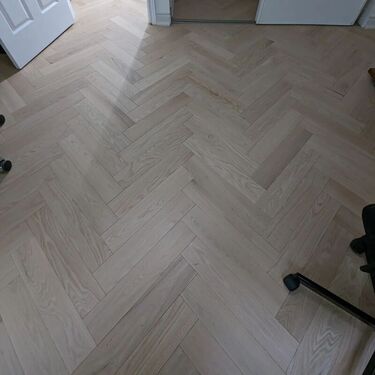 A room featuring oak hardwood flooring, showing its classic beauty and durability. A room featuring oak hardwood flooring, showing its classic beauty and durability.
Choosing the right hardwood for your flooring is a critical decision that can significantly impact the aesthetics, durability, and value of your home. With a myriad of options available, it can be challenging to determine which hardwood is the best for flooring. In this article, we'll explore various hardwood types, their pros and cons, and guide you in making the best choice for your Toronto home.
Durability: A Key Consideration
When it comes to hardwood flooring, durability is a crucial factor to consider. After all, you want your floors to withstand the test of time and the daily wear and tear. So, which hardwood flooring is the most durable?
Oak and maple are often touted as some of the most durable hardwoods for flooring. Both are hard, dense woods that can withstand heavy foot traffic and resist scratches and dents. However, the durability of your hardwood flooring also depends on its finish. A high-quality finish can enhance the durability of your floors, making them more resistant to scratches and stains. Our hardwood flooring finishes page provides more information on the different types of finishes available. Oak vs. Maple: A Closer Look
Oak and maple are two of the most popular choices for hardwood flooring in Toronto. But how do they compare, and which one is better for flooring?
Oak Flooring
Oak is a classic choice for hardwood flooring, known for its strength, durability, and beautiful grain patterns. It comes in two varieties: red oak and white oak. Red oak has a warm, reddish tone and pronounced grain patterns, while white oak is harder and has a more subtle, straight grain. However, do oak floors scratch easily? While no hardwood flooring is completely scratch-proof, oak's hardness and grain patterns can help hide scratches and dents. For more information on oak flooring, check out our solid hardwood flooring page.
Maple Flooring
Exploring Other Popular Hardwood Options
While oak and maple are popular choices, they are not the only options for hardwood flooring. Let's explore some other popular wood choices for hardwood flooring.
Walnut Flooring
Walnut is a beautiful hardwood known for its rich, dark color and straight grain. It's slightly softer than oak and maple, but its deep color can help hide scratches and dents. Walnut can add a touch of luxury and sophistication to any room. For more information on walnut and other hardwood options, visit our hardwood flooring styles page.
Hickory Flooring
Hickory is one of the hardest domestic hardwoods, making it an excellent choice for high-traffic areas. It has a varied grain pattern that can add character and warmth to a room. However, its hardness makes it more challenging to install and may require professional installation.
The Most Scratch-Resistant Hardwood Flooring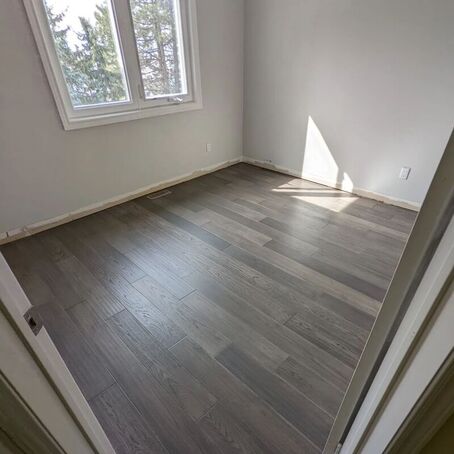 A high-traffic room with hickory hardwood flooring, demonstrating its durability and unique grain pattern. A high-traffic room with hickory hardwood flooring, demonstrating its durability and unique grain pattern.
While no hardwood flooring is completely immune to scratches, some types are more resistant than others. Hardwoods like oak, maple, and hickory are known for their durability and resistance to scratches. However, the finish you choose can also significantly impact the scratch-resistance of your floors. For instance, matte finishes can help hide scratches better than high-gloss finishes.
If scratch resistance is a top priority for you, consider engineered hardwood flooring. The top layer of engineered hardwood is real wood, but the underlying layers are designed to provide additional stability and resistance to scratches and dents. Check out our engineered vs. solid hardwood in Toronto blog post for a more in-depth comparison. The Rise of Engineered Hardwood Flooring
In recent years, engineered hardwood flooring has gained popularity among Toronto homeowners. But what is engineered hardwood, and is it a good choice for flooring?
Engineered hardwood is made of a core of hardwood or plywood with a layer of hardwood veneer affixed to the top surface. It's designed to reduce the moisture problems associated with conventional hardwood. Its multi-layered construction makes it more stable than solid hardwood, while still providing the beauty and warmth of real wood. Engineered hardwood can be a great choice for areas where solid hardwood is not recommended, such as basements or over radiant heating systems. It's also generally more cost-effective than solid hardwood. Our engineered hardwood flooring page provides more information on the benefits of engineered hardwood. Choosing the Best Hardwood Flooring for Your Toronto Home
Choosing the best hardwood flooring for your Toronto home depends on several factors, including your lifestyle, budget, and personal style. Here are a few tips to help you make the best choice:
Whether you prefer the classic beauty of oak, the modern appeal of maple, or the practicality of engineered hardwood, the best hardwood for your flooring is the one that meets your needs and complements your home's style.
At Parqueteam Hardwood Flooring, we're committed to helping Toronto homeowners make the best choice for their hardwood flooring. Contact us today for more information and guidance on choosing the perfect hardwood flooring for your home. Frequently Asked Questions
1. Which hardwood flooring is the most durable?
Oak, maple, and hickory are among the most durable hardwoods for flooring. They can withstand heavy foot traffic and resist scratches and dents. However, the durability of your hardwood flooring also depends on its finish. A high-quality finish can enhance the durability of your floors, making them more resistant to scratches and stains. 2. What is the most scratch-resistant hardwood flooring? While no hardwood flooring is completely scratch-proof, hardwoods like oak, maple, and hickory are known for their resistance to scratches. Engineered hardwood flooring, with its multi-layered construction, can also provide additional stability and resistance to scratches and dents. 3. What is the most popular wood for hardwood flooring? Oak and maple are two of the most popular choices for hardwood flooring due to their durability and beautiful grain patterns. Walnut and hickory are also popular choices for their unique colors and textures. 4. Is maple or oak better for flooring? Both maple and oak are excellent choices for flooring, each offering its unique advantages. Oak is known for its strength, durability, and beautiful grain patterns, while maple is even harder than oak, making it a great option for high-traffic areas. The choice between maple and oak will depend on your personal preference and the overall style of your home. 5. Do oak floors scratch easily? While no hardwood flooring is completely scratch-proof, oak's hardness and grain patterns can help hide scratches and dents. Regular care and maintenance can also help keep your oak floors looking their best. 6. Do maple hardwood floors scratch easily? Maple is a hard, dense wood that can resist scratches and dents. However, like any hardwood, it's not completely immune to scratches. Proper care and maintenance are essential to keep your maple floors looking their best. 7. What are the benefits of engineered hardwood flooring? Engineered hardwood flooring is designed to reduce the moisture problems associated with conventional hardwood. Its multi-layered construction makes it more stable than solid hardwood, while still providing the beauty and warmth of real wood. It's also generally more cost-effective than solid hardwood. Laminate Flooring in Toronto: A Comprehensive Guide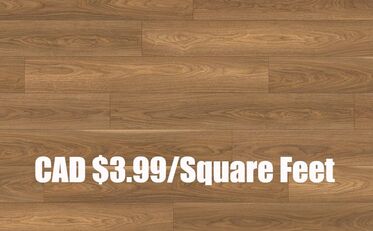 When it comes to flooring options, laminate flooring has become a popular choice for many homeowners in Toronto. This is due to its affordability, durability, and the wide variety of styles available. However, like any other flooring option, it comes with its own set of pros and cons. This blog post aims to provide a comprehensive guide to laminate flooring in Toronto, answering some of the most common questions homeowners have. The Cost of Installing Laminate Flooring in Toronto
Pros and Cons of Laminate FlooringLike any flooring option, laminate flooring comes with its own set of advantages and disadvantages. On the positive side, laminate flooring is durable, easy to clean, and resistant to stains and scratches. It's also available in a wide variety of styles, allowing you to mimic the look of more expensive flooring options like hardwood at a fraction of the cost. However, there are also some disadvantages to consider. Laminate flooring can be susceptible to water damage, making it a less ideal choice for areas with high moisture levels like bathrooms or basements. It can also be less comfortable to stand on for long periods compared to other flooring options. For a more in-depth comparison of laminate and hardwood flooring, you can check out our blog post on the topic. Laminate Vs. Hardwood Flooring: Which Is Cheaper?In terms of upfront costs, laminate flooring is generally cheaper than hardwood. However, it's important to consider the long-term costs as well. Hardwood flooring can last for decades with proper care and can be refinished multiple times, potentially making it a more cost-effective choice in the long run. Moreover, while laminate flooring is generally cheaper than hardwood, it's worth noting that hardwood flooring can last for decades and can be refinished multiple times, potentially making it a more cost-effective choice in the long run. Is It Worth To Install Laminate Flooring?Whether or not it's worth it to install laminate flooring depends on your specific needs and circumstances. If you're looking for a cost-effective, durable, and stylish flooring option, then laminate flooring can be a great choice. However, if you prefer the feel and longevity of real wood, then you might want to consider hardwood or engineered hardwood flooring instead. You can learn more about engineered hardwood flooring on our engineered hardwood flooring page. Where Should You Not Install Laminate Flooring?
Let's Wrap Things Up...In conclusion, whether laminate flooring is the right choice for you will depend on your specific needs and circumstances. If you're looking for a cost-effective, durable, and stylish flooring option, then laminate flooring can be a great choice. However, if you prefer the feel and longevity of real wood, then you might want to consider hardwood or engineered hardwood flooring instead. For more information about laminate flooring, or to explore other flooring options, feel free to visit our website. Our team of experienced professionals is always here to help you make the best decision for your home. Frequently Asked Questions About Laminate Floors in Toronto1. How much does it cost to install laminate flooring in Toronto?
The cost to install laminate flooring can vary depending on several factors, including the quality of the laminate and the complexity of the installation. On average, you can expect to pay between $2,000 and $8,000 for 1000 square feet of laminate flooring, including installation. 2. What are the disadvantages of laminate flooring? While laminate flooring is durable and easy to maintain, it can be susceptible to water damage if not properly sealed. This makes it less suitable for areas with high moisture levels, such as bathrooms or basements. 3. Is laminate flooring cheaper than hardwood? Generally speaking, laminate flooring is cheaper than hardwood in terms of upfront costs. However, hardwood flooring can last for decades and can be refinished multiple times, potentially making it a more cost-effective choice in the long run. 4. Is it worth it to install laminate flooring? If you're looking for a cost-effective, durable, and stylish flooring option, then laminate flooring can be a great choice. However, the decision ultimately depends on your specific needs and circumstances. 5. Where should you not install laminate flooring? Laminate flooring is not recommended for areas with high moisture levels, such as bathrooms or basements, as it can be susceptible to water damage. Is It OK to Install Engineered Hardwood Flooring in Your Toronto Kitchen?
Are you contemplating a kitchen remodel and wondering if engineered hardwood flooring is a viable choice? This is a question many homeowners in Toronto grapple with. While hardwood floors undeniably add a touch of warmth and sophistication, is it advisable to install them in a kitchen? Let's explore this.
The Allure of Engineered Hardwood Flooring
The Kitchen Environment: Challenges for Hardwood Flooring
A Case for Tile Flooring in the Kitchen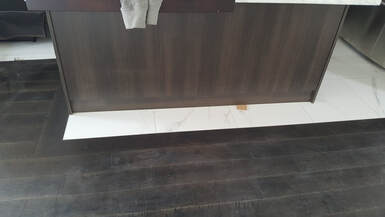 Engineered Hardwood Floor to Tile Transition Engineered Hardwood Floor to Tile Transition
Given the potential challenges with hardwood flooring in the kitchen, you might wonder if there's a more resilient option. This is where tile flooring shines. Tile is extremely durable, water-resistant, and easy to clean, making it an excellent choice for kitchens. It can withstand spills, stains, high foot traffic, and even hot pans, without sustaining damage.
While at Parqueteam Hardwood Flooring, we pride ourselves on our engineered hardwood flooring offerings in Toronto, we believe in providing our customers with the best advice for their specific needs. Given the potential for water damage and the higher maintenance needs, we typically recommend considering tile for kitchen flooring. Nonetheless, if your heart is set on the warmth and beauty of engineered hardwood, it can indeed be a suitable choice, given proper care and maintenance. In conclusion, while it's entirely possible to install engineered hardwood flooring in your kitchen, it's essential to be aware of the potential challenges. If you're ready to embrace the maintenance and care hardwood requires, it can certainly add a touch of elegance to your kitchen. But for practicality and durability, tile flooring might be the more sensible choice. FAQ
1. What is engineered hardwood flooring?
Engineered hardwood flooring is a type of flooring that combines a real hardwood surface layer with multiple layers of plywood or high-density fiberboard underneath. This construction makes it more stable and less susceptible to changes in temperature and humidity compared to solid hardwood. 2. How does engineered hardwood flooring compare to solid hardwood flooring? While solid hardwood is made entirely of a single type of wood, engineered hardwood consists of a thin layer of real wood on top and several layers of plywood or high-density fiberboard beneath. This makes engineered hardwood more stable and less prone to warping or shrinking due to changes in temperature or humidity. However, solid hardwood can typically be sanded and refinished more times than engineered hardwood. 3. What are the pros and cons of installing engineered hardwood flooring in a kitchen? The pros of installing engineered hardwood flooring in a kitchen include its attractive appearance, comfort underfoot, and durability. However, it can be susceptible to water damage if not properly sealed and maintained. It also has limitations when it comes to refinishing. 4. How do I maintain engineered hardwood flooring in a kitchen? To maintain engineered hardwood flooring in a kitchen, it's important to clean up spills immediately to prevent water damage. Regular sweeping or vacuuming can help remove dirt and debris that could scratch the floor. It's also recommended to use a damp mop and a cleaning product designed for engineered hardwood floors for regular cleaning. 5. Can engineered hardwood flooring be refinished? Yes, engineered hardwood flooring can be refinished, but the number of times it can be refinished depends on the thickness of the top layer of wood. It's important to consult with a flooring professional to determine if your engineered hardwood floor can be refinished. Engineered vs Solid Hardwood in Toronto: Is Engineered Flooring Just as Good?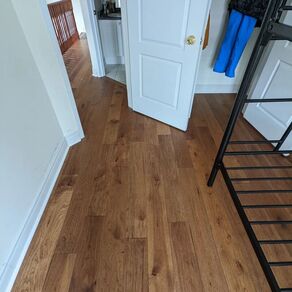 As a proud Toronto-based company specializing in all things related to hardwood flooring, we frequently encounter a question that many homeowners and property developers ask: "Is engineered hardwood just as good as solid hardwood?" This is an important question, especially for those of us in the Greater Toronto Area, where climate conditions can greatly impact the longevity and aesthetics of our floors. Understanding Hardwood Flooring: Solid vs. Engineered Before we delve into our main question, it's crucial to understand what we mean by "solid hardwood flooring" and "engineered hardwood flooring". Solid hardwood flooring is exactly what it sounds like: a flooring material made from a solid piece of hardwood. It's renowned for its timeless beauty, durability, and the value it can add to a property. Engineered hardwood flooring, on the other hand, is a layered product. The top layer is real hardwood, but it's bonded to several underlying layers of plywood or high-density fibreboard. This structure provides engineered hardwood with some unique benefits, which we'll discuss in more detail. The Merits of Engineered Hardwood FlooringEngineered hardwood flooring has grown increasingly popular in Toronto and the Greater Toronto Area, and for good reason. Here are some of the key advantages of engineered hardwood: 1. Stability: Engineered hardwood is less susceptible to warping and movement caused by changes in humidity and temperature. This makes it a great choice for areas where moisture levels can fluctuate, like basements or kitchens. 2. Versatility: Engineered hardwood can be installed over a variety of surfaces, including concrete and radiant heating systems, offering a flexibility that solid hardwood often can't match. 3. Variety: Because the top layer of engineered hardwood is real wood, it comes in as many species and styles as solid hardwood. You can find engineered versions of all your favourite hardwoods, from oak to maple to exotic varieties. Engineered vs Solid Hardwood: A Toronto Perspective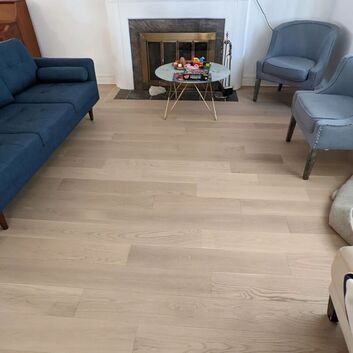 In the Toronto climate, where we experience both humid summers and dry winters, the stability of engineered hardwood can be a significant advantage. However, that's not to say that solid hardwood doesn't have its place. Solid hardwood flooring is often seen as the premium choice because of its potential for longevity. It can be sanded and refinished multiple times, which can keep it looking great for decades. Engineered hardwood can also be refinished, but the number of times depends on the thickness of the top layer. So, is engineered hardwood just as good as solid hardwood? The answer depends on your specific needs and circumstances. If you're looking for maximum longevity and have the right conditions to maintain it, solid hardwood is a fantastic choice. If you need something more versatile and stable, especially in areas with variable moisture or over concrete subfloors, engineered hardwood is likely the better option. In conclusion, both solid and engineered hardwood offer unique benefits and can be the "right" choice depending on your specific needs. As Toronto's hardwood flooring experts, we're here to help you make the best choice for your home or project. Don't hesitate to reach out to us with your hardwood flooring questions! |
Parqueteam Hardwood FlooringHardwood Flooring Toronto and The Greater Toronto Area. Archives
December 2023
Categories
All
|
Areas We Produly Serving... |
|


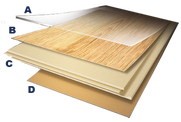
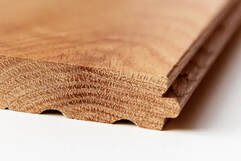

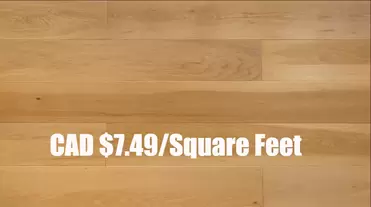
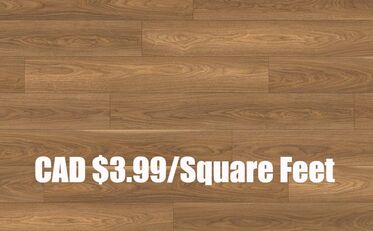
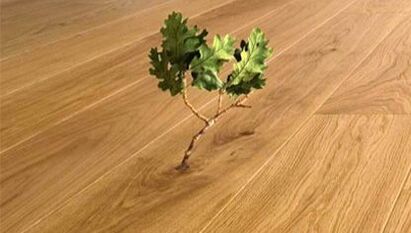
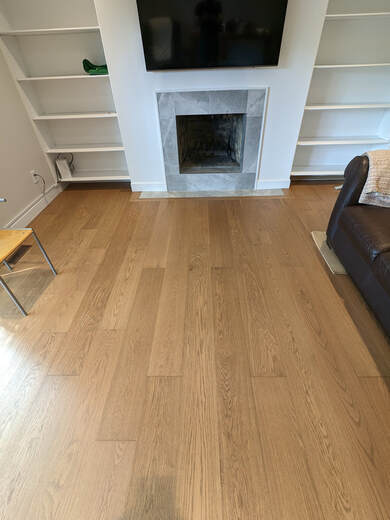
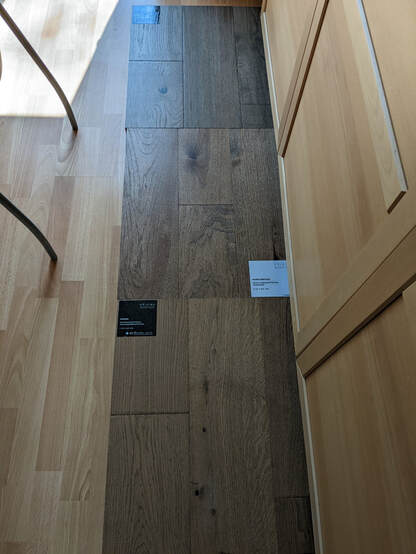
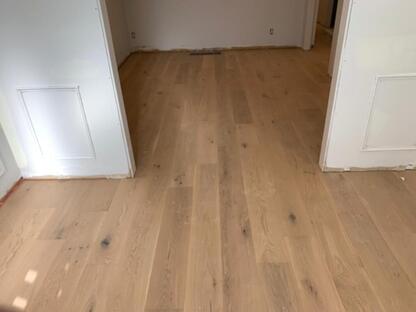
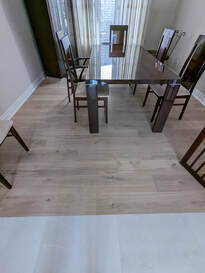
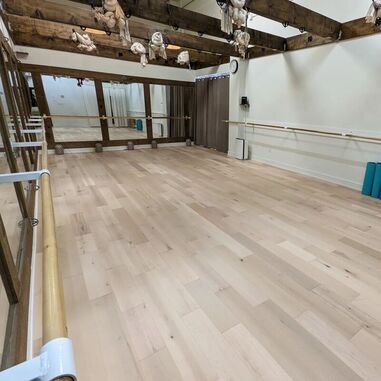
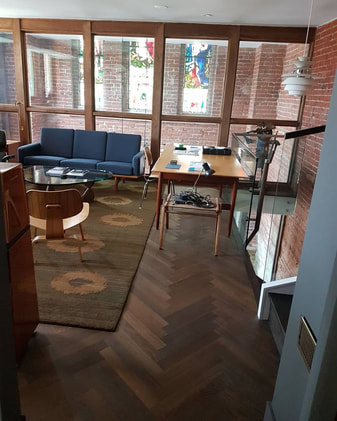
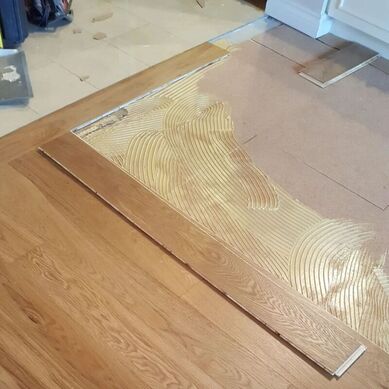
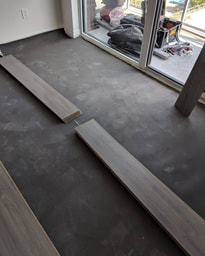
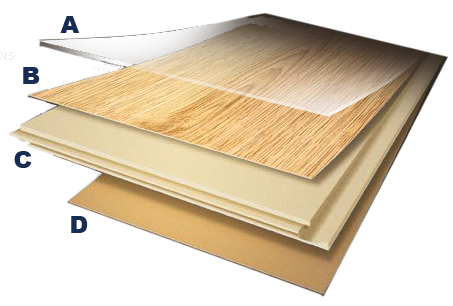
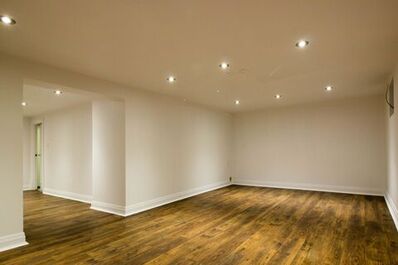
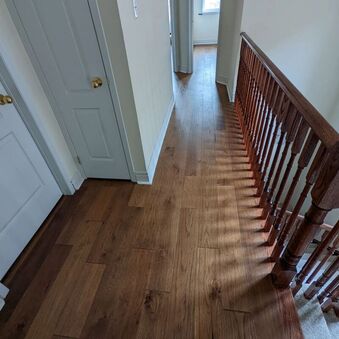
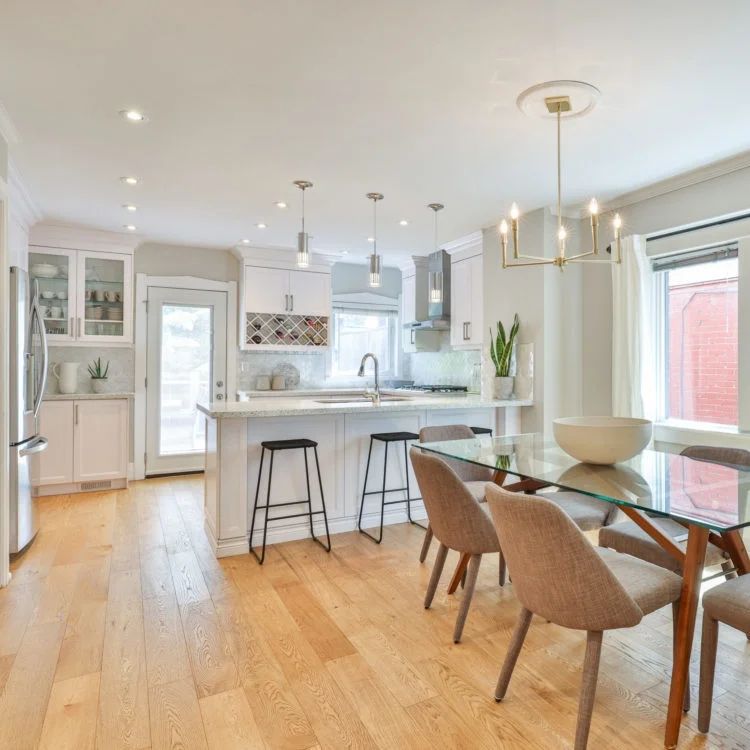
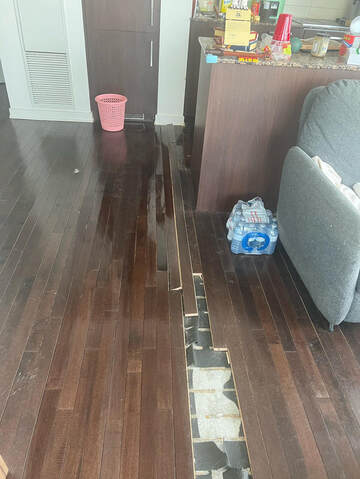
 RSS Feed
RSS Feed

